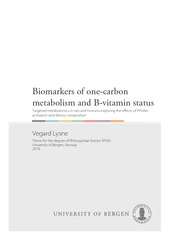| dc.contributor.author | Lysne, Vegard | en_US |
| dc.date.accessioned | 2019-12-10T14:05:02Z | |
| dc.date.available | 2019-12-10T14:05:02Z | |
| dc.date.issued | 2019-10-04 | |
| dc.date.submitted | 2019-09-04T11:50:48.683Z | |
| dc.identifier | container/7a/bf/e0/ed/7abfe0ed-fa2f-431f-a857-da94f6d61668 | |
| dc.identifier.isbn | 9788230867488 | en_US |
| dc.identifier.isbn | 9788230858080 | en_US |
| dc.identifier.uri | https://hdl.handle.net/1956/21069 | |
| dc.description.abstract | BACKGROUND: One-carbon metabolism is an overarching term describing central metabolic pathways involved in the transfer of one-carbon units. These include the methionine-homocysteine and folate cycles, as well as the choline oxidation and transsulfuration pathways, all of which depend on B-vitamins as cofactors. Circulating concentrations of several metabolites and intermediates of these metabolic pathways have been linked to chronic disease risk. Thus, extending our knowledge regarding the regulation of these pathways is warranted. Targeted metabolomics offers the opportunity to study the concentration of several metabolites of these pathways simultaneously, and is thus required for the thorough investigation of the effects of diet and other factors on one-carbon metabolism. Diet provides both substrates, cofactors and one-carbon units, influencing the complex regulation of the different metabolic pathways. Furthermore, of particular interest is the activation of the nuclear receptor PPAR (peroxisome proliferator-activated receptor) α, a lipid sensor involved in the regulation of energy metabolism. The overall aim of this thesis was to utilize targeted metabolomics to explore the effect of PPARα-activation and dietary composition on of one-carbon metabolism and B-vitamin status. The effect of pharmacological PPARα-activation was addressed in Paper I and II, taking advantage of studies in laboratory animals. In Paper III, the effect of dietary macronutrient composition was investigated in a cross-sectional analysis of a human cohort. METHODS: Animal models: We utilized data from two animal experiments, where male Wistar rats were treated with PPAR-agonists. In the first experiment, the rats received a pan-PPAR-agonist for 50 weeks. In the second experiment, specific PPARα and γ- agonists were administered for 12 days. In both studies, plasma concentrations of metabolites were compared between treated and control animals. Human study: This was a cross-sectional analysis in a cohort of 1928 patients with stable angina pectoris. Dietary data was derived from a food frequency questionnaire, and associations between dietary composition and plasma metabolite concentrations were assessed with multiple linear regression analyses. In all studies, plasma one carbon metabolites and B-vitamin markers were quantified by applying mass spectrometric methods. RESULTS: Long-term (Paper I) and short-term (Paper II) pharmacological PPARα-activation influenced the one-carbon metabolome, with the strongest effects seen for increased plasma concentration of nicotinamide and methylnicotinamide (vitamin B3), pyridoxal (vitamin B6), methylmalonic acid (marker of vitamin B12 status), dimethylglycine and glycine (choline oxidation pathway metabolites), and reduced flavin mononucleotide (vitamin B2). In humans, the observed effects of macronutrient intake were strongest for protein, where increased intake was associated with higher plasma concentrations of pyridoxal, pyridixal-5-phosphate and pyridoxic acid (vitamin B6), vitamin B12, riboflavin (vitamin B2) and methylnicotinamide. Further, we observed inverse associations between protein intake and plasma homocysteine and methylmalonic acid concentrations. When modeling the substitution of saturated with polyunsaturated fatty acids, we observed higher methylnicotinamide, pyridoxal, pyridixal-5-phosphate, cobalamin and dimethylglycine, as well as lower riboflavin concentrations. CONCLUSION AND IMPLICATION: PPARα-activation and dietary macronutrient composition altered the concentration of circulating biomarkers of one carbon metabolism. The effects of PPARα-activation were consistent across different conditions, and our results strongly suggest a central role for PPARα in the regulation of these metabolic pathways. Estimated effects of substituting saturated with polyunsaturated fatty acids yielded associations with the biomarkers similar to those observed with PPARα-activation in the animal studies. This suggests that the effects of diet on one-carbon metabolism, especially related to dietary fatty acid composition, may be partly mediated through altered PPARα-activity. This is the first metabolomic investigation targeting the majority of the metabolites of the one-carbon metabolism pathways simultaneously. Linking mechanistic studies in animals with observational data in humans provides novel information regarding metabolic regulations. The current investigations extend our understanding of how PPARα-activation and dietary composition influences the one-carbon metabolome. Application to the human situation will offer potential for more individualized dietary advice. | en_US |
| dc.language.iso | eng | eng |
| dc.publisher | The University of Bergen | eng |
| dc.relation.haspart | Paper I: Lysne V, Strand E, Svingen GF, Bjorndal B, Pedersen ER, Midttun O, Olsen T, Ueland PM, Berge RK, Nygard O. Peroxisome Proliferator-Activated Receptor Activation is Associated with Altered Plasma One-Carbon Metabolites and B-Vitamin Status in Rats. Nutrients. 2016;8(1). The article is available at: <a href="http://hdl.handle.net/1956/12333" target="blank">http://hdl.handle.net/1956/12333</a> | en_US |
| dc.relation.haspart | Paper II: Lysne V, Bjorndal B, Grinna ML, Midttun O, Ueland PM, Berge RK, Dierkes J, Nygard, O and Strand E. PPARα activation influences plasma one-carbon metabolites and B-vitamin status in rats. The article is not available in BORA. | en_US |
| dc.relation.haspart | Paper III: Lysne V, Parys AV, Nygaard E, Olsen T, Strand E, Marienborg M, Laupsa-Borge J, Haugsgjerd T, McCann A, Ueland PM, Dierkes J and Nygard O. Dietary macronutrient composition and plasma concentration of one-carbon metabolites and markers of B-vitamin status. A cross-sectional study. The article is not available in BORA. | en_US |
| dc.rights | Attribution-NonCommercial-NoDerivs (CC BY-NC-ND) | eng |
| dc.rights.uri | https://creativecommons.org/licenses/by-nc-nd/4.0/ | eng |
| dc.title | Biomarkers of one-carbon metabolism and B-vitamin status : Targeted metabolomics in rats and humans exploring the effects of PPARα-activation and dietary composition | en_US |
| dc.type | Doctoral thesis | |
| dc.date.updated | 2019-09-04T11:50:48.683Z | |
| dc.rights.holder | Copyright the Author. | |
| dc.contributor.orcid | https://orcid.org/0000-0002-0816-5075 | |
| dc.identifier.cristin | 1728747 | |
| fs.unitcode | 13-25-0 | |

